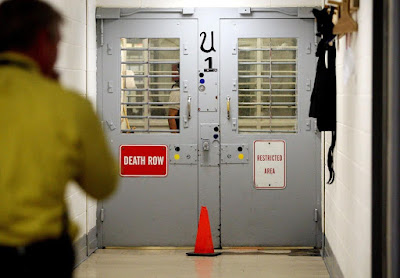Defense attorneys for the likely 1st ex-CIA captive to get a death-penalty trial at Guantanamo want to know how the U.S. military would execute him, if convicted.
Defense attorneys for the likely 1st ex-CIA captive to get a death-penalty trial at Guantanamo asked a war court judge Tuesday to order the Pentagon to declare how the U.S. military would execute the alleged USS Cole bomber, if he's convicted.
The question came up at a pretrial hearing in the case of Abd al Rahim al Nashiri, 49, accused of orchestrating al-Qaida's suicide bombing of the USS Cole warship off Yemen in October 2000. 17 U.S. sailors died in the attack.
The Saudi's defense lawyers invoked a string of botched U.S. executions by lethal injection in their argument that the Pentagon should settle on a mode of military execution before Nashiri's proposed February trial.
If the plan is "to take him out to a tree on a top of the hill at Guantanamo and hang him," potential jurors should be told, said veteran death-penalty defender Richard Kammen, a civilian who is paid by the Pentagon. He added that Congress has blocked the military from bringing a Guantanamo detainee to U.S. soil and "things don't really work very smoothly here."
While there are U.S. troops on military Death Row at Fort Leavenworth, Kan., the military hasn't carried out an execution since 1961 when it hanged an Army private for rape and attempted murder of a child.
Military spokesmen have said the Secretary of Defense decides the method of execution in the event of a conviction because the Manual for Military Commissions does not spell out how or where.
At the U.S. Southern Command, which supervises the prison here, Army Col. Greg Julian said Tuesday that no site had been selected for an execution chamber on this sprawling 45-square-mile base with a church, McDonald's and elementary school.
Prosecutors argue it's too soon for the government "to identify its plans and protocols" for a proposed method of military execution - and that, separately, discussion of it has no place in selection of the military jury that will hear the case, and no place at trial.
It "simply isn't ripe," said Pentagon prosecutor Justin Sher, a civilian.
"Mode and method of an execution that's not scheduled of an accused who is presumed innocent, until proven guilty beyond a reasonable doubt," he told the judge, "is not something that the members should be considering."
Kammen countered that military officers in particular, the men and women who will sit in judgment on Nashiri, may have strong opinions on whether to vote a death sentence, depending on the mode.
An officer may think, "I'm good with killing," said Kammen, "but I may not be good with doing it this way to this person under these circumstances, because it's way different than the battlefield, it's way different than an air strike. That's something that happens out of military operational necessity."
The judge, Air Force Col. Vance Spath, who successfully prosecuted a 2005 capital court martial in Georgia that's now under appeal, said he would rule later.
In a separate issue, Spath overruled the chief of the Guantanamo judiciary - Army Col. James Pohl, who assigned him - and said that he, Spath, would decide nearly all of the legal motions that Pohl had heard but not ruled on before handing him the case July 10.
Pohl declared he would rule on the outstanding legal motions even as he left the case to avoid scheduling conflicts with the Sept. 11 conspiracy case, where Pohl still presides.
Nashiri's attorneys estimate the number of outstanding motions at 59, and say 4 or 5 need to be re-argued. The prosecution had opposed more hearings on already argued motions. Spath said he would consider more oral arguments on any motion in light of new facts or law.
Nashiri got to Guantanamo in September 2006 after 4 years in secret CIA custody where, according to declassified misconduct reports, agents interrogated him by waterboarding, revving an electric drill near his head and subjecting him to a mock execution.
Examples of botched U.S. executions cited in the defense filing include:
-- Oklahoma's April 29 execution of rapist-murderer Clayton Lockett, who writhed on the gurney, moaned and clenched his teeth for several minutes after the lethal injection began. The execution was stopped after a doctor determined there was a problem with a single IV in Lockett's groin. He was subsequently pronounced dead of an apparent heart attack.
-- Ohio's Jan. 16 execution of Dennis McGuire, also convicted of rape and murder, who snorted and gasped for 26 minutes before dying of lethal injection.
-- Florida's Dec. 13, 2006 execution of Angel Diaz, convicted of murdering a Miami strip club manager. He took 34 minutes to die by lethal injection.
Source: Miami Herald, August 6, 2014










